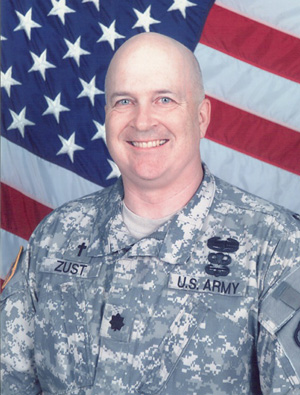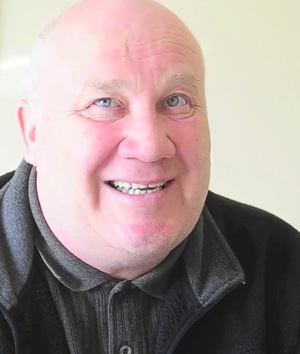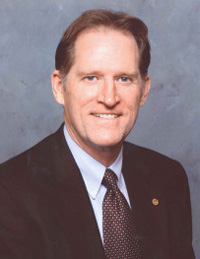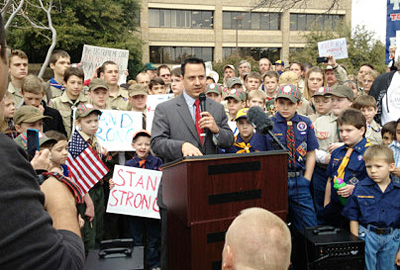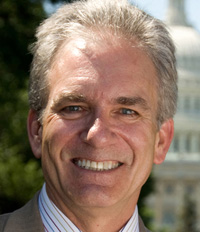BOSTON (BP)—In the aftermath of two bombs that exploded near the finish line of the iconic Boston Marathon, pastors and other leaders urged people to pray for Boston as the city grapples with questions that arise from tragedy.
Three people were killed and more than 170 were injured, including at least 17 still in critical condition, according to The Boston Globe. Metal fragments led investigators to believe the bombs were loaded with pellets or nails intended to harm as many people as possible, the newspaper said.
 (BP Photo)“I would say first of all to just pray for Boston. This was a huge shock,” said Jim Wideman, executive director of the Baptist Convention of New England. “Patriot’s Day is a state holiday and a day that the Boston Marathon is always run. It’s an exciting day for Boston. Up here, this far north, it really marks the beginning of spring for us.
(BP Photo)“I would say first of all to just pray for Boston. This was a huge shock,” said Jim Wideman, executive director of the Baptist Convention of New England. “Patriot’s Day is a state holiday and a day that the Boston Marathon is always run. It’s an exciting day for Boston. Up here, this far north, it really marks the beginning of spring for us.
“So, it’s a day that everybody looks forward to, and this action was calculated, I believe, to cause as much confusion as possible. It has left the city in shock.”
Amid that shock, a group of young adults from Prestonwood Baptist Church in Plano made themselves available to talk with and pray for passersby on the streets near the site of the bombings.
The group had been in town since April 11, working with Hope Fellowship Church, a Southern Baptist congregation about three miles away in Cambridge.
On April 15, the Prestonwood mission team handed out gum and invitations to Hope Fellowship to people watching the marathon.
“Some of our people actually walked down toward the finish line,” Josh Steckel of Prestonwood Baptist said.
About 2:30 p.m., less than half an hour before the blasts went off, the group started heading back to the church.
“Some people said they heard something that sounded like gunshots,” Steckel said. “We were away from the city when it happened, on our way back from the marathon already.”
That night, Hope Fellowship opened its doors for people to stop in and pray. Although residents of Boston were encouraged to stay home following what is being investigated as a terrorist attack, a few people from the neighborhood who aren’t normally part of the church showed up to pray and to be prayed for, Pastor Curtis Cook said.
“We will have a special service … as a time to pray, read Scriptures, sing and have a chance for others in the neighborhood who might want to come in as well,” Cook said.
Steckel’s team from Prestonwood was back out on the streets the day after the bombings, handing out granola bars, this time with signs on their bags that said: “Need prayer? We are available.” That simple invitation afforded several opportunities to pray with people and share the hope of Jesus, Steckel said.
They also secured cases of water and gave them to police and National Guardsmen stationed near the blocked-off crime scene.
“Tell people to pray boldly in Jesus’ name that the gospel-centered church planters and pastors here would have more opportunities to share the gospel and love on the people of Boston,” Steckel said. “Also pray for healing, that God would use this for revival and for his glory.”
Steve Brown, a bivocational church planter who moved to Boston last summer with his wife and two children, was anticipating opportunities to speak with his coworkers at The Container Store as he drove to work the morning after the bombing.
“The people that we’re close with, our friends and the people I work with for sure, they know that we’re Christians, and when things like this happen, it just creates a lot of questions in people’s minds, whether they are up front in talking about it or not,” Brown said.
Brown asked God to give him opportunities to share the hope and comfort of Christ with people in the midst of those questions.
“I think it makes people think about their worldview, whether they realize it or not. People think about why these things happen and where such evil comes from and where does God fit into this,” Brown said.
When tragedy struck in Newtown, Conn., in December, Brown talked with coworkers about how to process and respond to evil events in the world. He hopes to build on those conversations now, leading people to place their faith in Jesus.
Josh Wyatt, pastor of Charles River Church in Boston, landed at Boston’s Logan Airport just half an hour after the bombings and expected his wife and three children to be at the finish line to support one of their friends who was running. He was going to meet them there.
“By God’s grace, at a church marathon party that morning, church members talked my wife out of going because the crowds would be too challenging to navigate by herself with three young kids. Instead, she picked me up at the airport, we prayed with our children and began supporting victims and their loved ones and hurting Boston residents,” Wyatt said.
Wyatt used texting and social media to check on the safety of church members and to issue a call to prayer for Boston.
“We’re asking those outside to join us in prayer for the church in Boston, that we would unite to love our city well. Pray also that our city would experience the hope of Jesus,” Wyatt said. “For those who trust in him, ‘He will wipe away every tear from their eyes and death shall be no more, neither shall there be mourning nor crying nor pain anymore, for the former things have passed away.’”
Wideman noted the Baptist Convention of New England reached out to crisis incident management officials and to others who would need trained chaplains and pastors to step in and help people process the bombings.
“We are always looking for ways to build bridges to people who may not know Christ, and we’re hoping that we have an opportunity here as well,” Wideman said. “It’s brought up a lot of questions, and I know that our church planters and our pastors and lay people will have the opportunity to visit with neighbors and with friends.
“We just want to be sensitive when the opportunity arises to speak a word of hope because of Jesus into the lives of people who have been affected. We ask Southern Baptists to pray that we have those opportunities.”
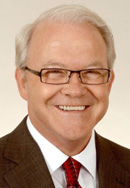 Frank Page“No youth may be denied membership in the Boy Scouts of America on the basis of sexual orientation or preference alone,” reads the proposed resolution, which also notes that the Scouts “will maintain the current membership policy for all adult leaders of the Boy Scouts of America.”
Frank Page“No youth may be denied membership in the Boy Scouts of America on the basis of sexual orientation or preference alone,” reads the proposed resolution, which also notes that the Scouts “will maintain the current membership policy for all adult leaders of the Boy Scouts of America.”
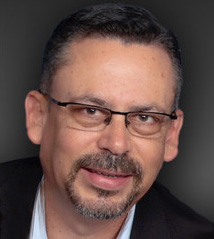

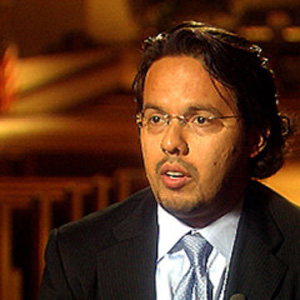

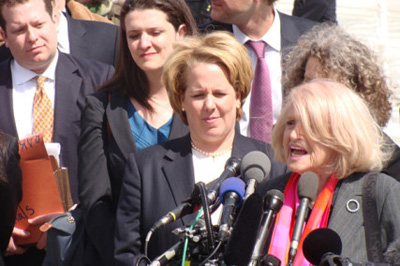
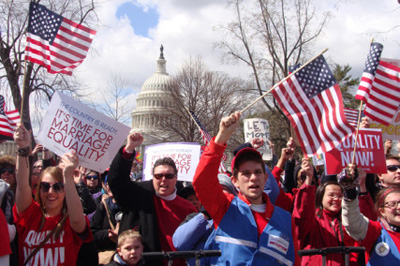
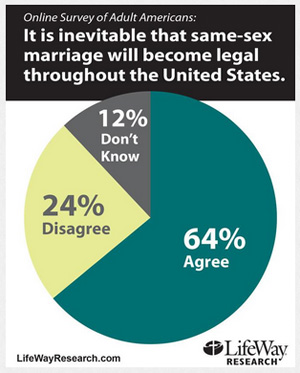 According to the findings, 64 percent of American adults believe same-sex marriage will become legal, whether or not they believe in it.
According to the findings, 64 percent of American adults believe same-sex marriage will become legal, whether or not they believe in it.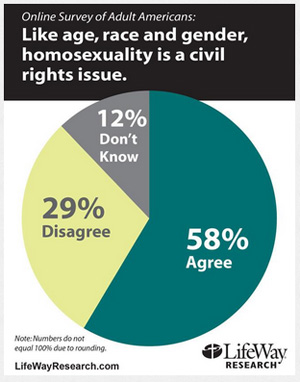 Ryan Anderson, a fellow of the conservative
Ryan Anderson, a fellow of the conservative 